
China is a very large country, and as you roam around it you’ll encounter different cultures, different landscapes, and different people. But in all of China’s many regions, you can travel with diabetes confidently: with preparation and a smart attitude, nothing bad will happen to you and your blood sugar in China.

Diabetic in China.
In this guide to travel in China with diabetes, get useful info about food and insulin doses in China, as well as information about keeping medication safe and communicating in Chinese about diabetes and your needs, plus advice for moving around China and getting the most out of your trip while taking proper care of your diabetes.
Preparing for China with diabetes
When going to China it’s best to do a little preparation up front, before you go, to make the trip as smooth as possible. As far as diabetes goes, this means taking care of your supplies.
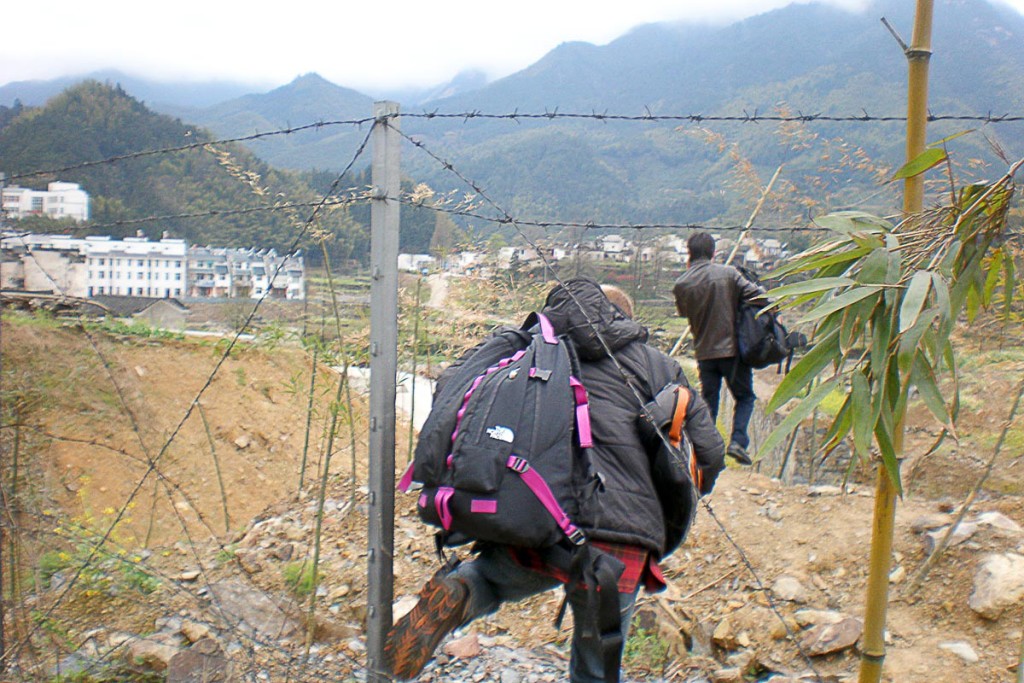
A little insulin in each bag, and you can go anywhere in China.
For a relatively short trip to China (a few weeks or less) it’s likely you can just carry everything you need with you. A good rule of thumb to follow is the “double” rule: calculate how much insulin, blood sugar testing supplies, needles, and other medical things you’ll need for the time you plan on spending in China, and then buy double that amount.
Split everything up into the bags you’re taking – if you’re traveling with a big suitcase and a smaller day pack, for example, put some of each supply in the big bag and some in your small bag. It is very unlikely that anything will happen to either bag or to your diabetes supplies, but this is a “just in case” type of preparation: you’ll always have a fallback. Even more important, perhaps, is that it gives you peace of mind.
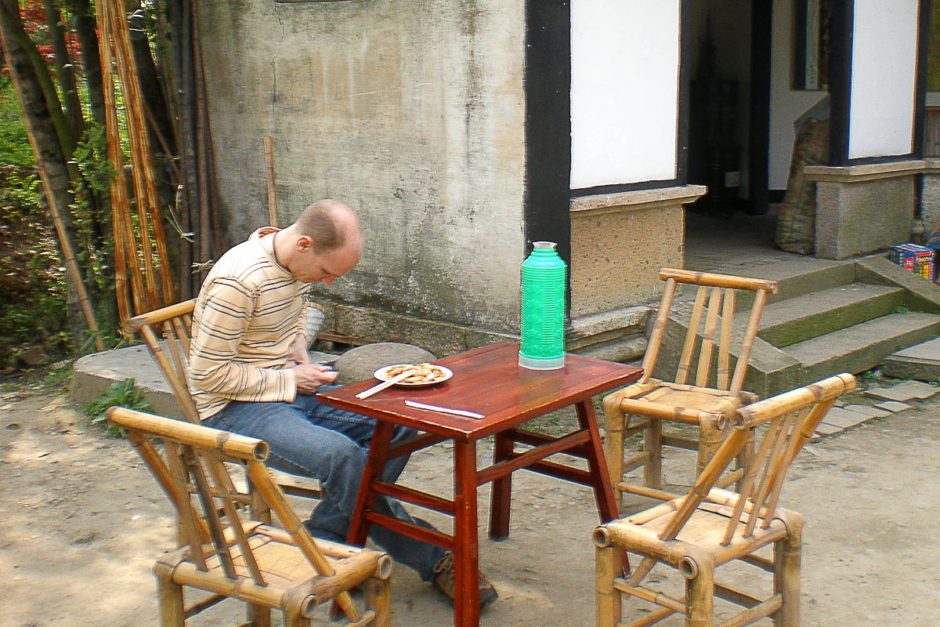
Insulin shot for noodles in Shaoxing.
Many diabetics are afraid of what might happen to them if they were to explore China with diabetes, and they dream up all kinds of scary scenarios. The result is that too many diabetics choose not to venture out into China, or elsewhere in the world. It’s a shame, and it’s totally avoidable. The fear is all in your head, and while splitting up your supplies into each of your bags has its practical benefits, the psychological benefit is likely the most important.
Now that you’ve got your supplies all set, you need to work on having the right general attitude. If you already have this attitude – and you must to a large degree, or you wouldn’t be considering something crazy like traipsing around China as a diabetic! – then good for you.
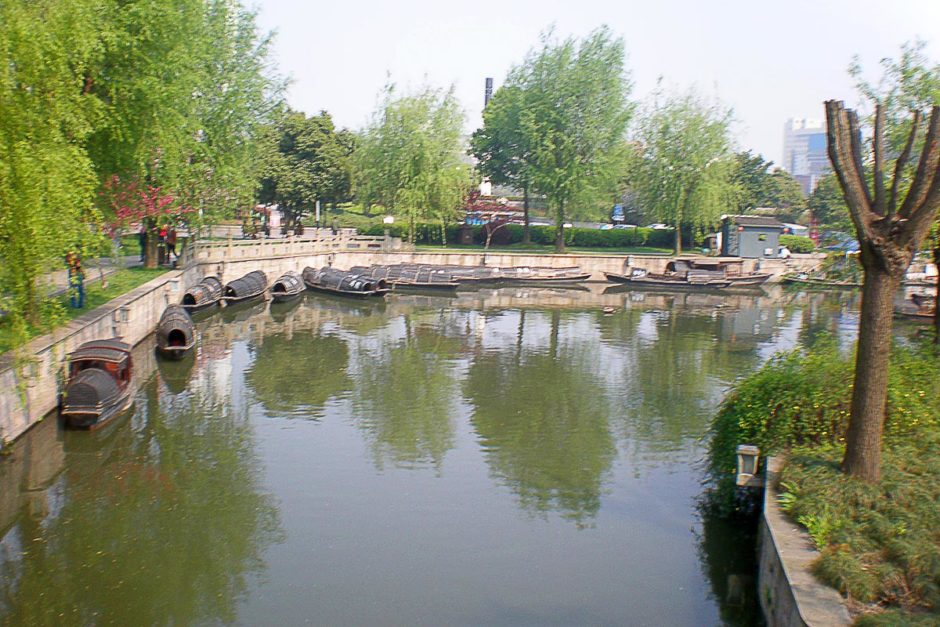
But if you need a little encouragement and inspiration, then internalize the great universal truth of traveling, anywhere including China, with diabetes:
Nothing bad will happen to you.
Yes, of course something bad could happen. To you, or anyone. But it won’t. Statistically, it is so unlikely that you can completely ignore it. You’ll be prepared and smart and positive, and nothing bad will happen to you.
Got it? Nothing bad will happen to you! Repeat it until it sinks in. It’s true. Your fears are just fears. Shut off that chatter and get going!

Food and insulin in China
“Chinese food” means different things in different places. In my country of America, for example, it refers to a rather narrow and heavy range of fried dishes, thick with rich sauce and super high in carbs. In my adopted home of Japan, “Chinese food” refers to several salty and spicy dishes with a little more vegetable content than that of America. And so on for other countries.
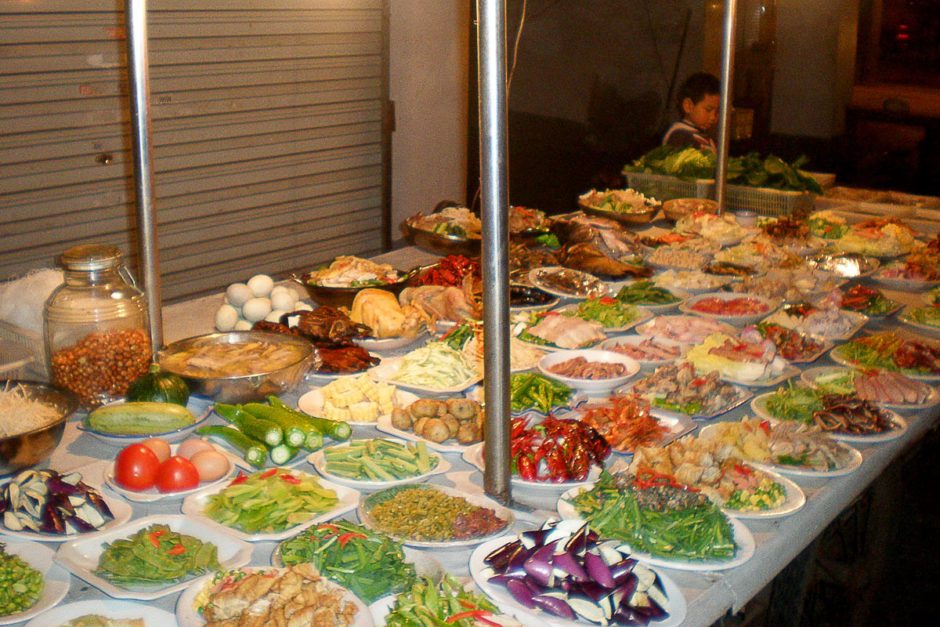
But actual food in China – a vast country, remember – takes on a character that is much more varied than many visitors are prepared for. There may be some similarities with “Chinese food” outside the country, but once inside China you’ll have to adapt to the reality of cuisine there when it comes to your diabetes.
Chinese food does often include rice and thick sauces, but it can also include noodles and, especially in western China, bread from Central Asia. Fresh, simple vegetables and meats often make up the main dish while white rice is served alongside it. You can find fried things as well, just like in other places.
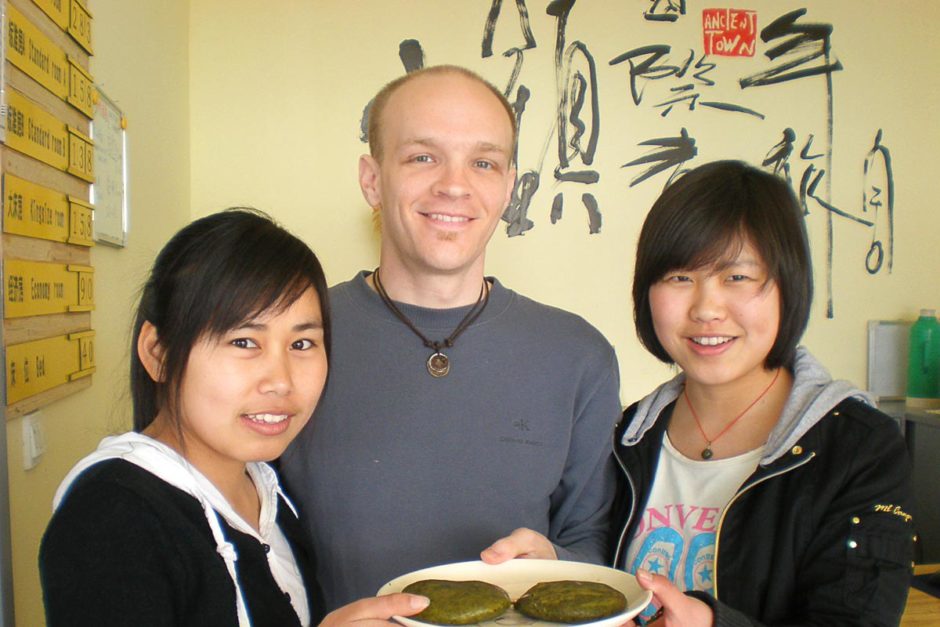
As a diabetic traveler to China, you will have to learn how different foods affect your own specific diabetes. The most important rule is to check your blood sugar often – make your best guess when eating, then verify later. If anything, you may be like many travelers and have more high blood sugars than low: rice is of course thick in carbs, but noodles can be surprisingly thick too – as much as rice.
Travelers often eat at street stalls – and you are definitely encouraged to do this; Chinese street food can be amazing. Be careful with the insulin doses though; even simple things like green peppers on a stick or dumpling soup can have sweet sauces on them or dense carbs that make blood sugar high. The cheap, large Chinese beer bottles too can include lots of their own carbs. (I personally don’t like Chinese beer that much, but it’s undeniably good with street food with other diners at a sea of card tables on a cool evening.)
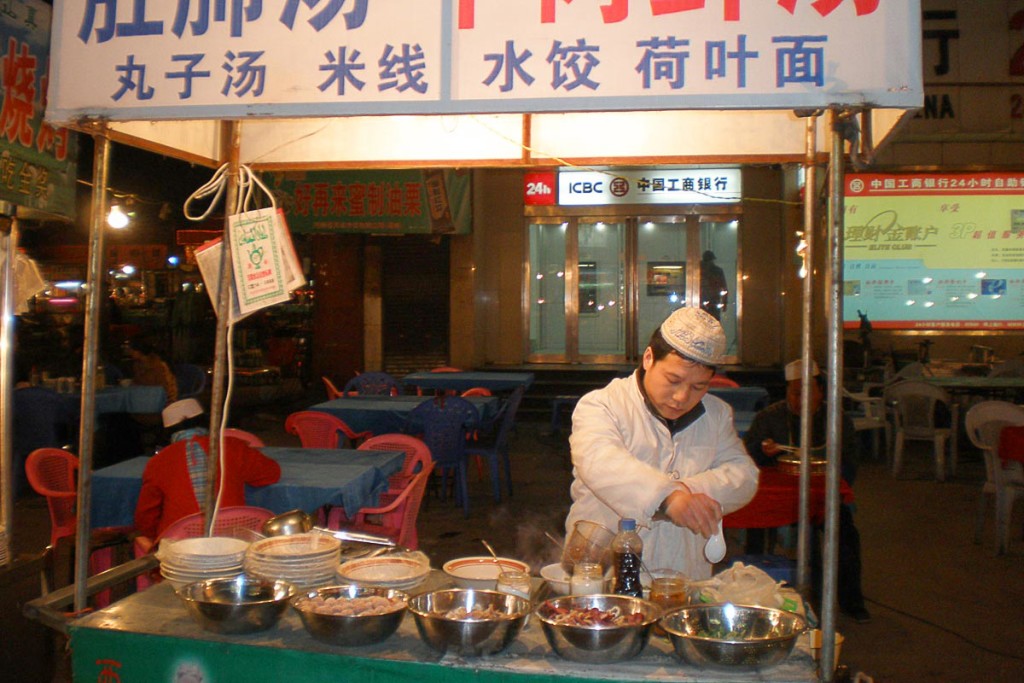
The bread and lamb-type dishes, more common in western Asia, can also be thick in carbs but are more like pizza dough – if you know how to dose for pizza (but who does, really? ;)) then it’s roughly the same. Make sure, whatever you’re eating, to take into account any exercise you’ve been getting, even walking around a town. The hot sun in summer can affect some diabetics’ blood sugars too; if this is you, be careful.
But whatever your approach to insulin and food in China, try to keep this in mind: eat what you want. If you have the type of approach to diabetes that lets you adjust your dose depending on what you eat, then don’t let diabetes force you to shy away from new foods. It’s your adventure, and enough insulin will kill pretty much any carb content. You must check after every meal, maybe twice, to see how you’re doing. But food is part of the fun of traveling, and diabetes can’t take that away from you.

Xiaoyaojin Park in Hefei.
Story – Sugar tomatoes in western China
Once in a distant town in west China called Golmud I went to one of the few shops I could find open one afternoon. It was an unlit room with a big window near the train station.
I ordered something that turned out to be sliced tomatoes sprinkled liberally with sugar crystals.
I never eat straight sugar – I don’t even keep it in my house – so I didn’t know how to dose my insulin for it. But, I figured if I wasn’t diabetic I’d be eating this same dish anyway, so diabetes would just have to accommodate it.
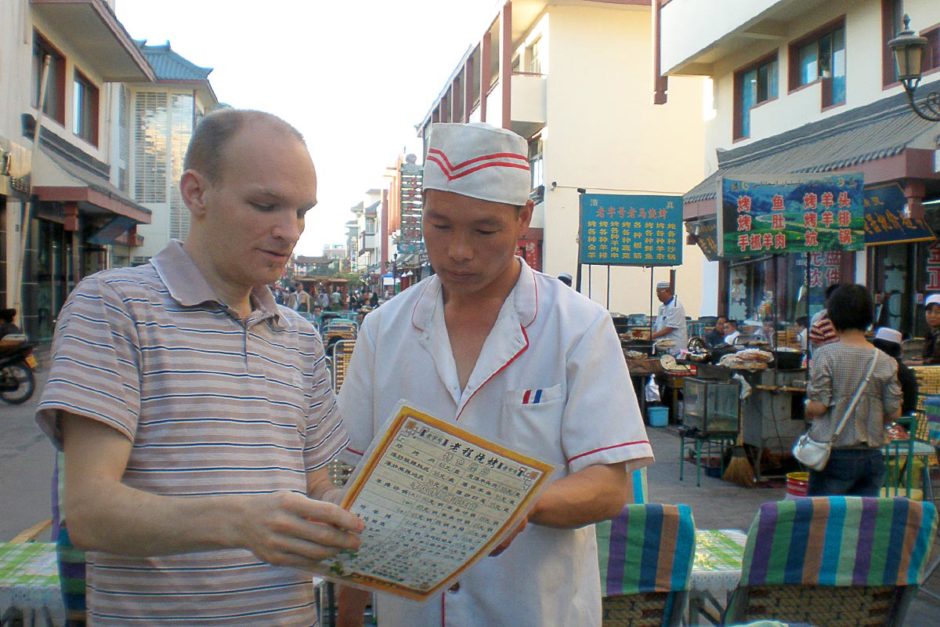
I got out my insulin pen and injected carefully in my stomach, right at the table, after eyeing the plate and asking my travel partner how much of it she thought she might eat. And then I tucked in.
The tomatoes were cool and smooth, and the sugar was crunchy and sweet; it was a simple dish, obviously, but quite tasty. And my blood sugar wasn’t too bad afterwards. I had merely guessed, but had luckily guessed well. (Checking soon afterwards was key.)
I had at that point been in China over two months already, and was developing a second sense about the food I was eating. Not perfect all the time, certainly, but getting better with each experience.
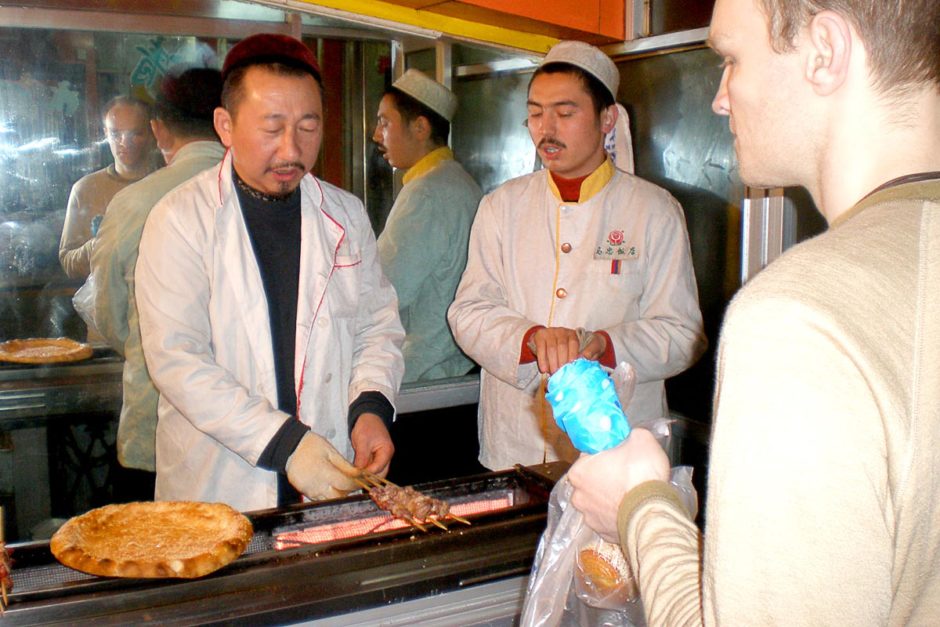
That’s how to get the most out of any trip anywhere as a diabetic, when it comes to eating: eat what you want, guess the insulin, verify afterwards, and learn. No regrets!
If you’re saving money, or tired of street and restaurant food, you might find yourself eating things from shops like instant noodles. Sometimes that’s all that’s available, as on some Yangtze River overnight boat tours. Small shops are frequent, and nutrition info is generally printed on the packaging and will be easy to figure out.
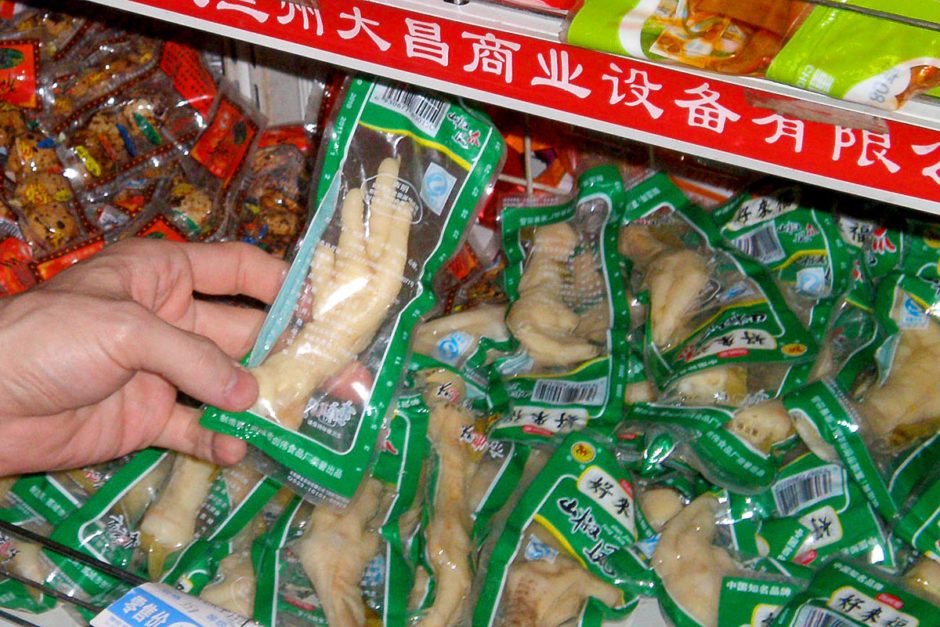
Insulin vs. chicken feet snacks: I’ll let you figure this one out.
Low blood sugar snacks
Always carry low blood sugar snacks with you in China. You don’t have to bring a huge supply from home or anything – juice and cookies, or whatever else you like, will be available nearly everywhere.
Nearly everywhere – it is possible to get stuck in some small town, or on a bus or train or boat with no services whatsoever. So if you’re getting low on snack supplies, buy more when you can. Always try to aim to carry a little bit more than you could need.
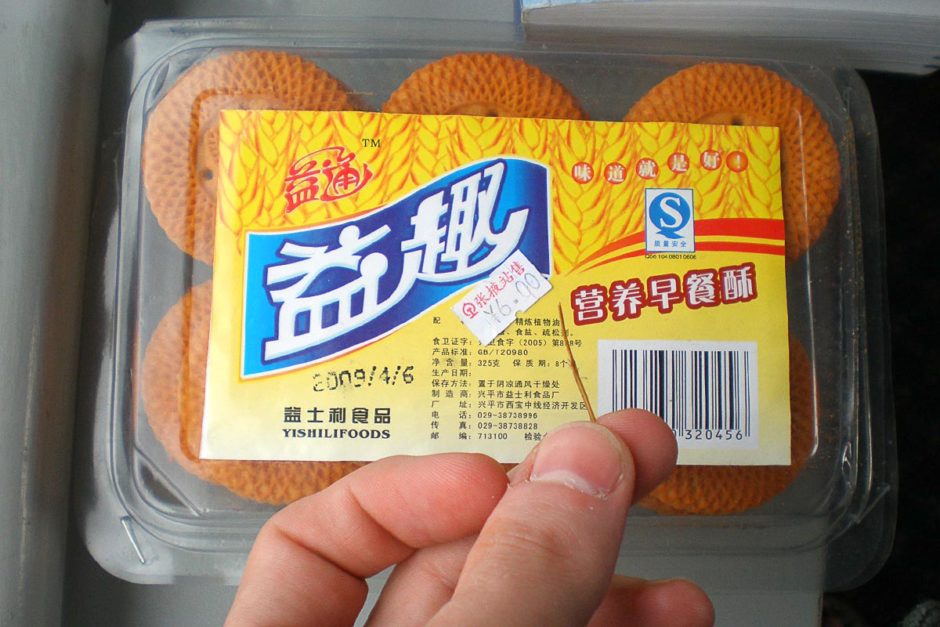
These cookies I purchased on a train platform came with their own bonus twig.
And never leave the hotel even for a short time without it! Use a day pack and always carry some insulin, blood sugar stuff, and food in it. If you’re off hiking or something, carry a lot more.
Keeping insulin cool in the sunshine
Many parts of China can get really hot in summer. You should keep insulin cool, and the best way is with a freezer pack or a Frio bag, cool and stuck inside your day pack. Keep it out of the direct sunlight, which means sticking it down in your bag so it isn’t even sunlight-adjacent. (I always wrapped it up in a shirt or towel so it was several layers away from the sun.)
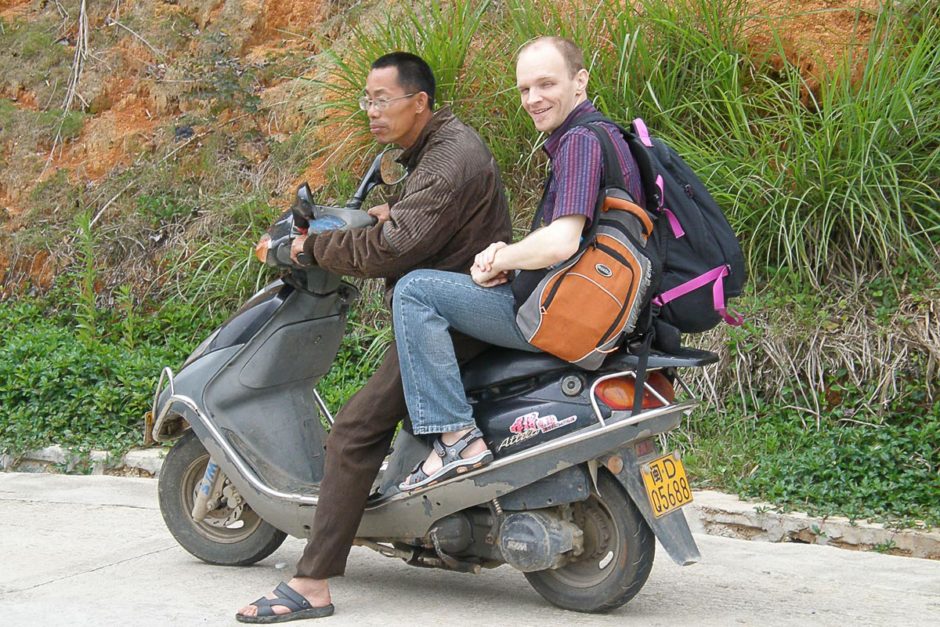
You’d be surprised how cool it can stay, even in the most glaring heat. But then again, you’d be surprised how well insulin can survive a few days in some pretty warm circumstances. Of course, if should be kept as cool as possible but it’s yet another thing that many diabetics over-worry about. In other words, prepare for it: if you’re worried, buy a cold pack. But keep in mind that I’ve spent many months at a time in some very hot places and never had any problem with insulin losing effectiveness.
Nothing bad will happen to you.

How to speak Chinese – for T1Ds
What if you have to tell a Chinese person that you’re diabetic?
First of all, this is very unlikely. Second of all, if it does become necessary, it’s not as hard as you might think to explain your situation.
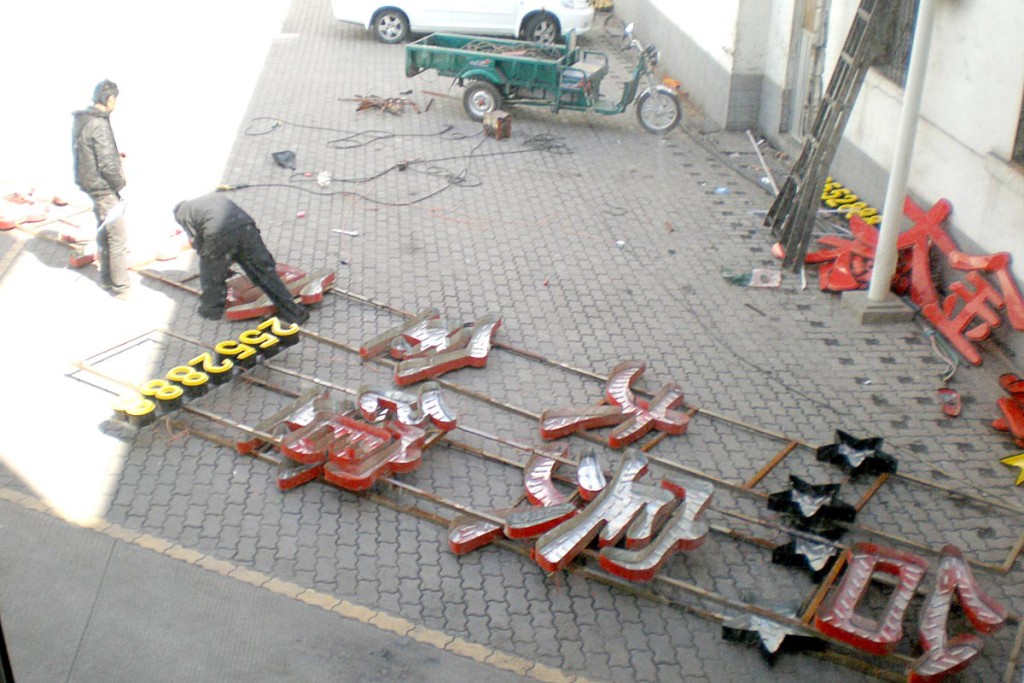
Our hotel was having its sign worked on. China loves the inherent art of its writing system.
Many medical professionals, which is the type of person you’d most likely be speaking to about diabetes, could understand the English word “diabetes”. If they don’t understand it when you say it, they may well understand it if you write it down.
But if all else fails, you can just use the Chinese version. You can say it, or show them a printed-out version.
- diabetes – 糖尿病 – pronounced “tong nyow bing”
Try to say the “tong” part like a question, with your voice rising in tone: “tong?” Say the “nyow” (like “yow!” with an “n” sound in front of it) and “bing” parts each with the opposite, a falling tone. Chinese pronunciation is difficult for newcomers; you can try the above but just to be sure, copy and paste the Chinese characters 糖尿病 in a document and print it out.
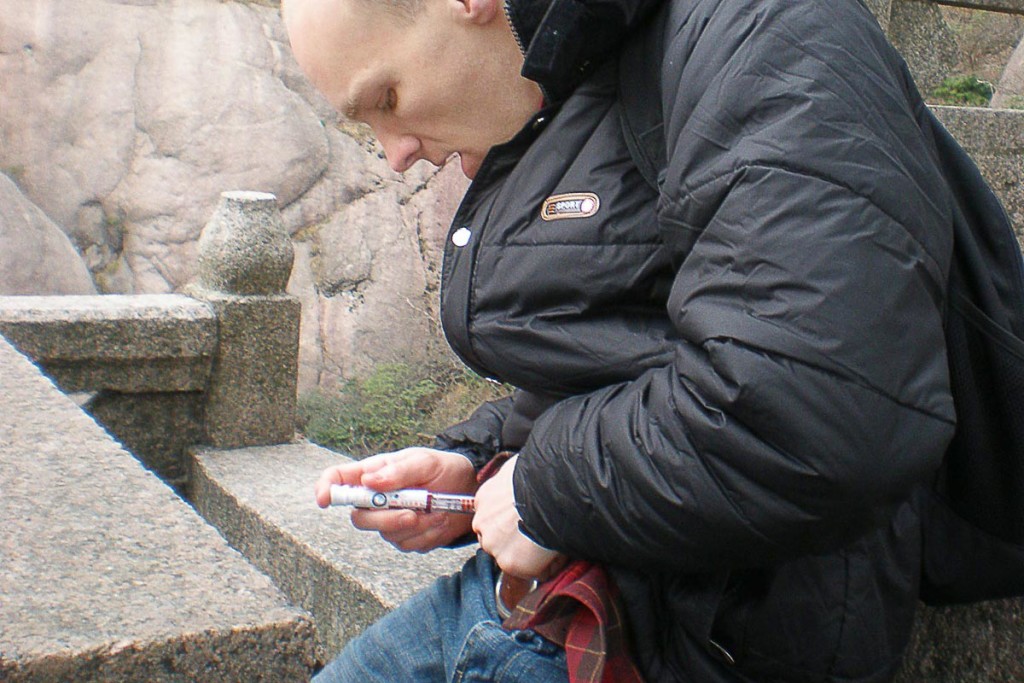
- Type 1 diabetes – 1型糖尿病 – pronounced “ee shing tong nyow bing”
- Type 2 diabetes – 2型糖尿病 – pronounced “arr shing tong nyow bing”
- insulin – 胰岛素 – pronounced “ee dow SOO”
Again, it’s unlikely you’ll need this – an emergency is very unlikely if you’re checking your BG often and always carry low blood sugar snacks around with you – but it’s handy to have. If all else fails, just wave around an insulin pen or something related to diabetes; medical personnel want to help and are knowledgable and can figure it out.
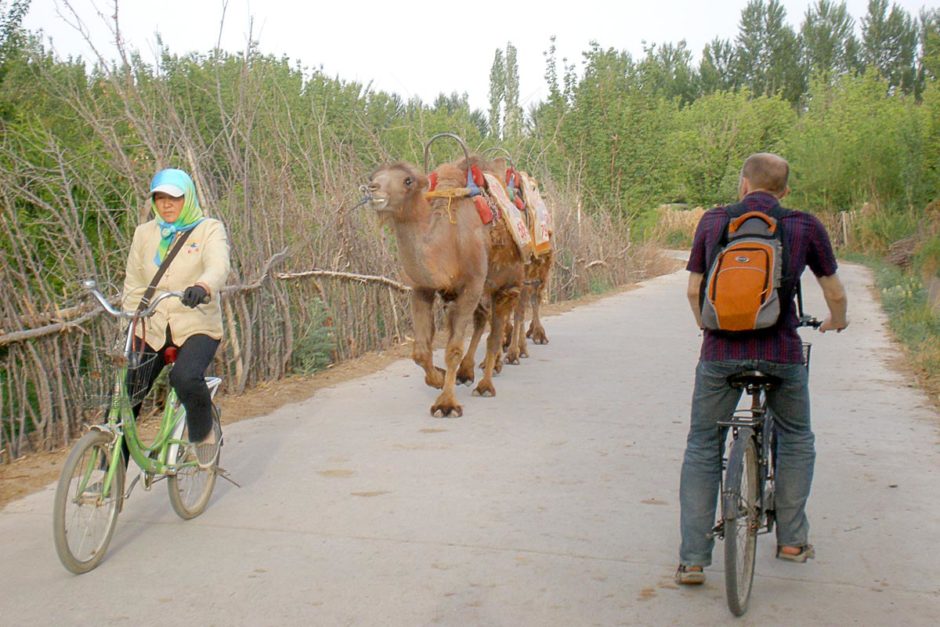
You should seriously consider wearing some piece of jewelry that alerts people to your condition. An English phrase like “DIABETIC” or “TYPE 1 DIABETES” should be easily understood by anyone who would be checking for it. Again, this is a practical and safe thing to do, but also allays your fears. After all, nothing bad will happen to you right?

I come all this way and close my eyes for my Great Wall photo?
Your trip to China
If you have visited China, whether or not you or a travel partner had diabetes, I’d like to hear about your experiences there. Where did you go and what did you eat?
If you’re thinking of heading off to China and would like to add a question or comment, please do. It’s a great place, truly a world apart from everywhere else, full of fascinating and impossibly old and creative pieces of culture in every corner. And always remember:
You can go anywhere with diabetes!
Read more about my travels in China
Come along on the adventure! Follow detailed travelogues about the wondrous sights, fascinating people, and varied diabetes experiences I encountered as a traveling T1D in China:
Day 1: The Big Grey Skies Of Xi'an, China
Day 5: The Ancient Clay Army And The Small Wild Goose
Day 7: The Amazing Food Stalls Of Kaifeng
Day 12: Saying "yes" To A Chinese Tout Was A Good Choice
Day 14: Laundry Service Plus Vomit: The Tale Of Hefei
Day 24: The Secret Misty Mountain Town Of Tangkou, China
Day 26: Struggling Up China's Sacred Huangshan Mountains
Day 31: Lose Yourself On "Old Street" In Ancient Tunxi
Day 36: Shaoxing And The Mysterious Yin-yang Of Travel
Day 46: Gulangyu, A Chinese Community Like No Other
Day 47: Fujian Tulou Houses And The Perfect Kindness Of Strangers
Day 49: Tea Leaves And Local Families In Taxiacun
Day 51: Overnight Stay In Zhuzhou, A Town I Can't Remember
Day 53: Eight Days In A Backpacker's Oasis In Wuhan, China
Day 64: Three Nights On The Smoggy, Majestic Yangtze River
Day 68: I Left My Jaw In Chongqing's Hotpot
Day 72: Xining, The High And Dry Fulcrum Of Central China
Day 74: Golmud, Dusty Crossroads On The Edge Of Nothing
Day 75: Through The Desert To Dunhuang With Special Permission
Day 79: Sand Dunes And Street Food In Distant Dunhuang
Day 87: Three Days In Beijing Without Sightseeing
Thanks for reading. Suggested:
- Share:
- Read next: Tips for traveling to Japan with diabetes
- News: Newsletter (posted for free on Patreon every week)
- Support: Patreon (watch extended, ad-free videos and get other perks)

Support independent travel content
You can support my work via Patreon. Get early links to new videos, shout-outs in my videos, and other perks for as little as $1/month.
Your support helps me make more videos and bring you travels from interesting and lesser-known places. Join us! See details, perks, and support tiers at patreon.com/t1dwanderer. Thanks!

We’re going to China in a few weeks with our 10 year old daughter who was diagnosed with Type 1 just over a year ago. Your article was really reassuring and informative. Thanks!
Thanks Cerys. I hope you have a great trip! I’ve love to hear about your experiences there, diabetic and otherwise.
Enjoyed your article, thanks Jeremy. My daughter is travelling to China in August for 6 months. She is type 1. Will she be allowed to take a 6 months supply with her? What are the requirements going through customs?
Hi Maureen,
As far as I know there aren’t specific limits that are regularly enforced if traveling to China with six months’ worth of medication. Documents that show A) the plan for being there that long, and B) your medical requirements (a note from a doctor, in English, saying that insulin is necessary for the six-month time frame) should be plenty.
They may not bat an eyelid at all. The worst-case scenario would be they don’t allow her to take it all; I absolutely can’t imagine that happening but if so, buying insulin while in the country should be pretty simple.
Bottom line: no problem. Bring a note from a doctor saying she’ll need her supplies for six months on the off chance they ask for it. What is your daughter going to be doing in China for six months? Sounds fun 🙂
hi !
your response to a comment , to buy iinsulin while yourr in the country (China),, really caught my eye.
my diabetic friend is currently living in Macau, and due to the present pandemic, he cant go home, and now starts to worry as he is nearing to his last insuin vial. i was wondering if you have any idea as to where he could buy insulin within Macau. He’s been looking around for several weeks but couldnt find any. were really hoping you could give us an idea on this. thank you so much.. good day!
Maureen,
I am in a similar situation , how did you daughter get on? what documents did she bring in the end, was there any difficulty? many thanks.
[…] READ MORE: TIPS FOR TRAVELING TO CHINA WITH DIABETES […]
Hi
I liked reading your article because it did ease my mind a lot! I am a diabetic myself and I will be travelling to China later this year (for 2 weeks), it will be my first trip going that far. (I’m from Belgium) The only thing I’m still wondering about is if I can get any trouble at Chinese airports when carying my insuline pens and needles with me. And if so, does the airport staff understand English (my doctors note and explaination is in English) or should I have some Chinese text with me as well?
🙂
Hi Nikita,
I think English will be fine. There will almost certainly be no problem at the airport with pens and needles; they see it a lot and aren’t interested. If there is some problem your note will help; someone will understand enough English to get it. (Also you can use the Chinese for “diabetes” from this page and they’ll definitely get it!)
Good luck and have fun; come back and let me know how everything goes for you!
Hi
Thank you for your answer and helping me out with this!
I’ll be going in September so I will not be able to tell you about my adventure any time soon but I’ll try to remember it when the time comes!
Nikita, Sounds good. You can always subscribe to free email updates from T1DWanderer to be sure you don’t forget about the site: https://www.t1dwanderer.com//subscribe/
Enjoy anticipating your trip 🙂
Dear Jeremy,
I am sending to a school trip my son to China for 10 days. He is 14 and has been diagnosed 3 months ago with Diabetics type 1. His doctors gave the green to go but it is a scary decision for me to take as his mom. Your article is very useful and I know that I have to let him go fo r his own good. I strongly agree with you that diabetes should not take over his life. Could you give us more specific carbs estimation on some main Chinese food you had there? Thank you, so much for sharing your stories. Anne
Hi Anne,
I would say that rice and noodles are common in China, and would be the main carb focus. Both are fairly thick in carbs but would be roughly the same, by weight. Sauces can also be pretty sweet. Basically, things tend to have more carbs in China than I might personally think
As for your son, I’d say he should just do some experimenting with dosages and not worry too much about going high until he starts to get better at understanding Chinese food. Always keep something with him for lows too. Juice and cookies (for example) are easy to find in shops everywhere and, like instant noodles, will actually have carb info printed on them that should be easy to figure out.
I think he’ll be fine and have a lot of fun. Might get a little high sometimes (that was a problem more than lows for me in China) but will adapt and improve.
Where in China is he going? It sounds like fun! Let me know how it goes 🙂
Where did you dispose of your sharps? That is what I am confused about. My mother and I both have type2 (I also will be infusing with needles under the skin for an immune issue I have) and I’m just not sure if we should bring a sharps container or if we can purchase one there. Any ideas or help would be appreciated
Hi Karen,
I would bring one with you. You could certainly find one there but you’d have to work it out somehow, ask around and draw photos and smile and gesture. It could be fun but just to be easier I’d say take one with you. Enjoy your trip!
Jeremy,
Thank you so very much for your article. I’m going to Chongqing this summer to teach a class I just got diagnosed with type 1. You’ve really calmed me down. For the snacks how did you figure out carbs on the labels? I’m in Canada and it’s easy. And for an average dish of dumplings how would you measure the wrappers?
John
John,
I never learned the Chinese characters for “carbohydrates”, but I learned about where they are on the nutrition facts section of the label. It’s usually pretty easy to figure out which it is, and you’ll learn to recognize them pretty quickly.
Personally, for dumplings I took too little insulin at first. They’re much thicker than I thought! After a time or two I learned to guess much better. I’m all for making a mistake and then correcting the next time – as long as you know your BG afterwards nothing bad will happen.
Enjoy Chongqing, please come back and let me know how you find it! I was only there a day or two and it’s a vast population center so of course I couldn’t see all of it.
This article is amazing! I am a type 2 diabetic and am planing to spend a month in China this Summer. This is so helpful.
Thanks Jimmie! Where are you going in China? It’s a great place to visit. Please come back here and let us know about your experiences in China.
What advice would you offer to people with type II who are not insulin dependent? I’m in in the process of going to teach there for a year.
David,
Mostly the same as Type 1s: once you get there, figure out where the medical resources are that you’ll need, and don’t be afraid of it! Once you have the doctors, pharmacies, medical system, etc figured out it’ll be smooth. Enjoy the process of learning about it. Good luck!
How did you keep a three month supply of insulin pens to China cold? It will take over 24 hours of layovers and flight times to get to China from US. Will it go bad if it isn’t kept cold
Jamie,
I actually bought some insulin while in China, so I wasn’t traveling with a full three-month supply. But to keep my supply cool I usually use cold packs – you can try Frio packs which keep themselves cool for a long time and are specially built for insulin storage. I have used simple foil bags with an ice pack, then refrigerators in guesthouses when I find them.
Also when I was in China it was early spring and everywhere was pretty chilly so I didn’t have to worry much about it! But I have never had insulin go bad from being unrefrigerated for a little while – flight, etc, even in hot places like Thailand. Not to say it couldn’t happen but I wouldn’t worry too much.
Hi Jeremy,
thanks for your helpful article. I’ll probably travel with my mom for 2-3 weeks, she is diabetic after panc removal. In case we need to buy insuline in Chine, it is enough a medical prescription written in english or should we translate it officially in chinese too? We are from Italy.
Thanks a lot!
You are a great example
Flavio
Flavio,
When I bought insulin in China I just went to a pharmacy and bought it over the counter. I don’t think I needed any prescription. But if you do need to use one I think English would be understood, although they probably wouldn’t accept one from an Italian doctor (only Chinese).
Hopefully you won’t need any prescription. But a pharmacy in a big city or town should be able to explain in English how you can get insulin. They’ll be sure to help you, don’t worry!
Enjoy your trip.
hi Jamie,
would love to know how you got on? did you use the trio bag like jeremy, any other tip?
Hi Jeremy! Great article! I live in china, I’ve been living in Shenzhen for over a year now and I am confident with hospitals and pharmacies. My cousin will come to visit me in few days and she ha type 1 diabetes. I am a little worried but we have travelled before together in Europe and she’s been diagnosed almost 10 years ago so she knows exactly how to manage herself. However my concern is more related to her taking her normal dosage of insuline in public in restaurants and so on. I read in the article that you’ve done it in a restaurant after eating, but I was wondering if you were ever questioned or if you encountered anyone who was concerned with you using it in public. I’m asking because in London while my cousin was doing her normal dosage in a shop a man asked her to not do drugs in his place of business. She is from Italy and she only has an Italian doctor’s paper.
Thank you very much!!
Georgia,
Thanks for the comments. Wow! I’ve never been approached by anyone for doing a shot in public, except years ago when a woman saw me put a metal insulin pen in my pocket and thought I was stealing silverware.
I’ve never had anyone in China or elsewhere say anything, but I try to be very discreet so nobody would notice. If that isn’t possible or likely (depending on the restaurant layout, etc) then I do go off to the bathroom to do it. Of course your cousin can learn the word for “insulin” or “diabetes” or “medicine” as a rejoinder to anyone who objects.
But my philosophy is that some people don’t like needles and don’t want to see an injection. I can respect that so I don’t show it off to anyone if I can help it.
I hope things go well for you guys. Let me know how she fares in China with T1D, or tell her to stop by and leave a comment herself. Thanks!
I’ve experienced this too while giving an injection discreetly at the table this woman’s jaw dropped open and she started whispering to her friend. I’m sure she thought I was using drugs. It’s a hard experience to take
This is a very interesting article and thank you for that.i just came back from China – I was over only for 3 weeks but planning to go back for a minimum of 3 months to a year.
Was wondering how much are insulin over there? I use at the moment novorapid and levemir both on pen – so I need to get the cartridges and needles. However, i’m planning to bring as much supply as possible but just in case….thanks
hi, you have mentioned every aspect of the topic in this article, just wanna say that i really appreciate the efforts you have put in!
Very insightful article, very helpful, thanks